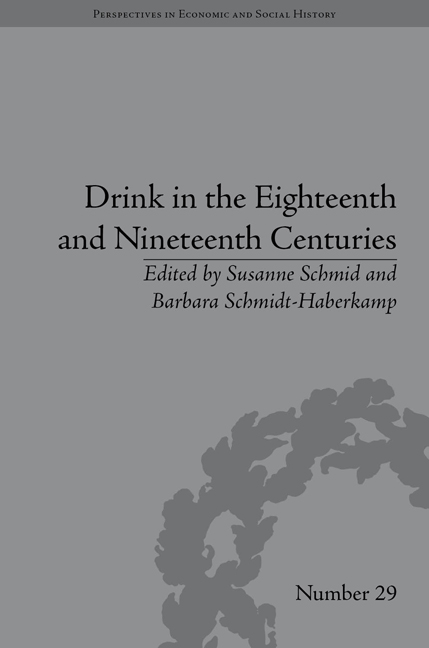Book contents
- Frontmatter
- CONTENTS
- Acknowledgements
- List of Contributors
- List of Figures and Tables
- Introduction
- Part I Ritual and Material Culture
- Part II Institutions and Social Class
- Part III Temperance and the Misery of Alcohol
- Part IV Intoxication and Therapy
- 9 Alcohol, Sympathy and Ideology in George Gissing's The Nether World (1889) and The Odd Women (1893)
- 10 Legends of Infernal Drinkers: Representations of Alcohol in Thomas Hardy and Nineteenth-Century British Fiction
- 11 The Spirit of Medicine: The Use of Alcohol in Nineteenth-Century Medical Practice
- Part V Case Studies: Rum, Cocoa and Magical Potions
- Notes
- Index
9 - Alcohol, Sympathy and Ideology in George Gissing's The Nether World (1889) and The Odd Women (1893)
from Part IV - Intoxication and Therapy
- Frontmatter
- CONTENTS
- Acknowledgements
- List of Contributors
- List of Figures and Tables
- Introduction
- Part I Ritual and Material Culture
- Part II Institutions and Social Class
- Part III Temperance and the Misery of Alcohol
- Part IV Intoxication and Therapy
- 9 Alcohol, Sympathy and Ideology in George Gissing's The Nether World (1889) and The Odd Women (1893)
- 10 Legends of Infernal Drinkers: Representations of Alcohol in Thomas Hardy and Nineteenth-Century British Fiction
- 11 The Spirit of Medicine: The Use of Alcohol in Nineteenth-Century Medical Practice
- Part V Case Studies: Rum, Cocoa and Magical Potions
- Notes
- Index
Summary
Throw wide the doors of the temple of Alcohol! Behold, we come in our thousands, jingling the coins that shall purchase us this one day of tragical mirth.
George Gissing, The Nether World (1889)I
References to alcohol are ubiquitous in the work of the underrated and under-read late-nineteenth-century author George Gissing. Especially in his early novels, which deal almost exclusively with the working class, pubs and other establishments selling alcohol provide settings for character action and interaction. They are peopled by publicans, barmaids, and potboys and girls carrying jugs of beer to customers' homes; they contain cameo appearances of incorrigible drinkers in various states of inebriation and depict scenes of domestic violence committed under the influence; and even in Gissing's later work, with its focus on middle-class themes and concerns, there are still passing references to ‘pledge cards’ collected on mantelpieces and/or bedside tables, symbolizing characters' repeated failure to live up to their promise never to drink alcohol again.
It is tempting to explore such evidence of Gissing's interest in alcohol and its consumers for its contextual dimension, whether by connecting it to the cultural background at large or to the writer's personal experience. Indeed, alcohol had a topical significance in late Victorian public discourse, notably in the form of moral panics surrounding the issue of drink, and such general concerns would have left their mark on the writing of any contemporary author, especially one as sensitive to the social issues of his day as Gissing.
- Type
- Chapter
- Information
- Drink in the Eighteenth and Nineteenth Centuries , pp. 103 - 114Publisher: Pickering & ChattoFirst published in: 2014



